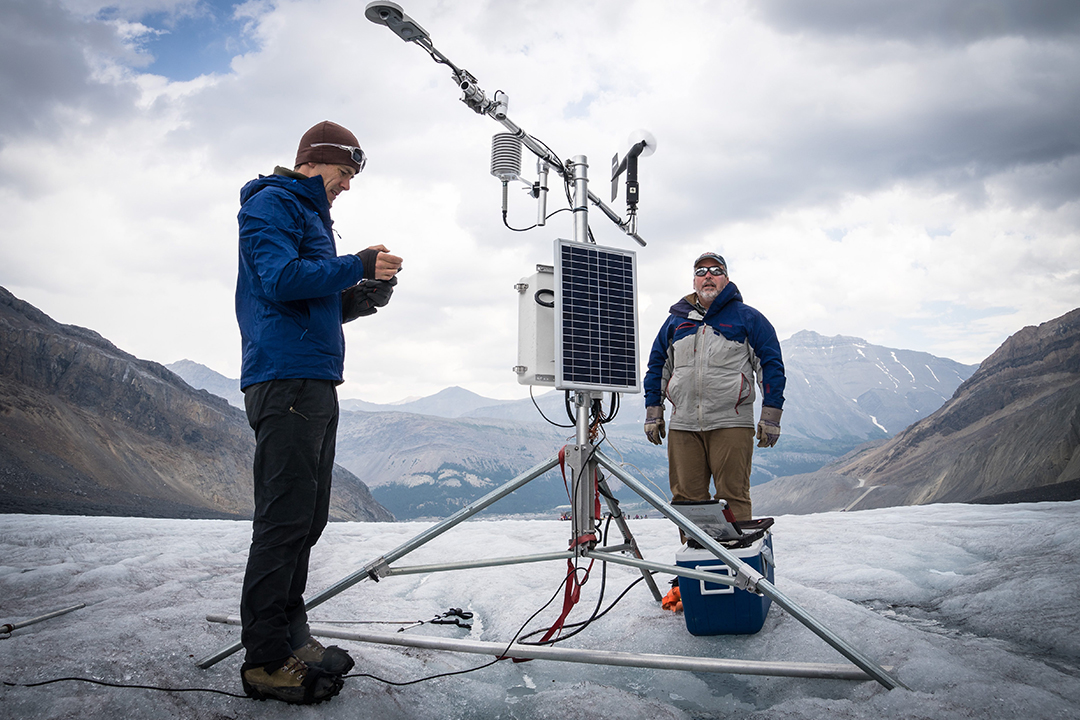
U of S-led Global Water Futures announces 21 new projects
Research aims to predict Canada’s future hydrology and support decision-making
SASKATOON – Global Water Futures (GWF), the world’s largest university-led freshwater research program, has announced 21 new projects across Canada—valued at over $10 million in total—to address critical water security challenges, from the melt of mountain glaciers and the thaw of northern permafrost, to prairie food production, river basin prediction and the health of the Great Lakes.
“With the hydrology of Canada and all cold regions changing dramatically due to climate change, these 21 new projects will help us understand, diagnose and predict change, and develop new tools, such as sensors, analytical procedures, and computer models to support water-related decision making,” said John Pomeroy, director of GWF and professor of hydrology at the University of Saskatchewan (U of S).
“The outcomes of this torrent of new science will include a better understanding of snow and rain storms, floods and droughts, as well as how to better measure and manage the quality of source waters; how deep groundwater is affected by the surface; how water affects human health in Indigenous communities; how to improve water governance; and even how to encourage global water citizenship,” he said. “This new knowledge will let us develop a picture of what Canada’s water might look like and how we can best manage water for the future.”
The U of S will lead nine of the new projects, with the University of Waterloo leading six, McMaster University and Wilfrid Laurier University each leading two, and the University of Quebec at Montreal and University of Manitoba each leading one.
Funded by a Canada First Research Excellence Fund grant, GWF now has 33 projects underway across Canada, valued at over $170 million and involving 15 universities and 172 partners.
Over the next three years, GWF will train and hire 450 researchers and scientists, many as graduate students, to work on these projects and provide core support for the research program.
“We have entered the ‘Great Thaw’ due to rapid climate change, and with economic growth and changing ways in which we use the land, we now have more damaging droughts, fires, floods, algal blooms, and water quality advisories than in the past, yet also emerging opportunities for food and energy production through enlightened water management,” said Pomeroy.
He noted that water is “Canada’s most precious natural resource—one that drives our economy, supports our communities and is the basis for our ecosystems and life itself.”
For more information on these projects, visit our website at: globalwaterfutures.ca.
About Global Water Futures
Global Water Futures is a seven-year, University of Saskatchewan-led research program established within the Global Institute for Water Security in 2016 and funded in part by a $77.8-million grant from the Canada First Research Excellence Fund. The research goal is to transform the way communities, governments and industries in Canada and other cold regions of the world prepare for and manage increasing water-related threats. The program was developed and funded in part by the U of S with three key partners – the University of Waterloo, McMaster University, and Wilfrid Laurier University.
-30-
For more information, contact:
Jennifer Thoma
Media Relations Specialist
University of Saskatchewan
306-966-1851
jennifer.thoma@usask.ca
University of Saskatchewan-led projects:
- Collaborative Modelling Framework for Water Futures and Holistic Human Health Effects, Lalita Bharadwaj, University of Saskatchewan
- Old Meets New: Subsurface Hydrogeological Connectivity and Groundwater Protection, Grant Ferguson, University of Saskatchewan
- Omic and Chemical Fingerprinting Methodologies using Ultrahigh-Resolution Mass Spectrometry for Geochemistry and Healthy Waters, Paul Jones, University of Saskatchewan
- Short‐Duration Extreme Precipitation in Future Climate, Yanping Li, University of Saskatchewan
- Diagnosing Policy and Governance Effectiveness for Agricultural Water Management During Times of Change, Philip Loring, University of Saskatchewan
- Crowdsourcing Water Science, Graham Strickert, University of Saskatchewan
- Adaptation Governance and Policy Changes in Relation to a Changing Moisture Regime Across the Southern Boreal Forest, Colin Laroque, University of Saskatchewan
- Hydrological Processes in Frozen Soils, Andrew Ireson, University of Saskatchewan
- Improved Estimates of Wetland Evaporation, Warren Helgason, University of Saskatchewan
Other Canadian university-led projects:
- Linking Water Governance in Canada to Global Economic, Social and Political Drivers, Rob de Loe, University of Waterloo
- Evaluation of ice models in Large Lakes using Three-Dimensional Coupled Hydrodynamic-Ice Models, Kevin Lamb, University of Waterloo
- Linking Stream Network Process Models to Robust Data Management Systems for the Purpose of Land-Use Decision Support, Bruce MacVicar, University of Waterloo
- Winter Soil Processes in Transition, Fereidoun Rezanezhad, University of Waterloo
- Linking Multiple Stressors to Adverse Ecological Responses Across Watersheds, Mark Servos, University of Waterloo
- Significance of Groundwater Dynamics within Hydrologic Models, Walter Illman, University of Waterloo
- Southern Forests Water Futures, Altaf Arain, McMaster University
- Sensors and Sensing Systems for Water Quality Monitoring, Ravi Selvaganapathy, McMaster University
- Global Water Citizenship - Integrating Networked Citizens, Scientists and Local Decision Makers, Colin Robertson, Wilfrid Laurier University
- SAMMS: Sub-Arctic Metal Mobility Study, Brent Wolfe, Wilfrid Laurier University
- Storms and Precipitation Across the Continental Divide Experiment (SPADE), Julie Theriault, University of Quebec at Montreal
- Diagnosing and Mitigating Hydrologic Model Uncertainty in High-Latitude Canadian Watersheds, Tricia Stadnyk, University of Manitoba

